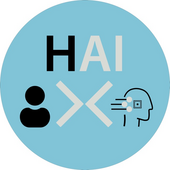More and more industry, business and science applications employ multiple AI techniques and AI workflows to solve complex problems and automate as well as optimise complex processes and decision-making. To establish trust in such hybrid, or staged, AI systems, the combined result of the entire system must be explained to the human user. Although individual AI algorithms may be explainable independently, integrated hybrid systems usually lack this ability. However, for Trustworthy AI systems, explainability is one of the ethical principles to which these systems should adhere during their development, implementation, and deployment (AI HLEG, 2019). An example for such a hybrid AI is the planning of weed harvesting operations in aquatic environments, which is the scenario chosen to develop the proposed Hybrid AI explainer (HAI-x) methodology. Here, different AI methods are applied to different sub-tasks to create a plan for conducting the harvesting operation in an optimal way. These kinds of planning and operation tasks occur often in environmental sciences, where mobile field operations need to be optimised in a way that areas of interest must be fully covered whilst avoiding restricted areas. Other examples of this class of problems are the mapping of harmful algae bloom, mapping of submerged groundwater discharges, and the path-planning of sensors surveys of unmanned aerial vehicles. These problems usually require the identification of both, the areas of interest and the area of avoidance, i.e., restricted areas. Both can change over time and therefore must be identified dynamically. For practical applications, such as the weed harvesting example, not only an optimal plan is required by human decision makers but also an explanation of the plan and the underlying machine learning model(s) to enable trust. Thus, the proposed project develops the Hybrid AI explainer (HAI-x) to shed light in ‘black box’ hybrid AI systems.
The system will be developed on two levels:
- A lab-based scenario to perform rapid testing of sensors, algorithms, and design concepts;
- On a vehicle provided by boat manufacturer BERKY GmbH for data collection, field tests, and evaluation.
Although development is taking place on a concrete example, HAI-x is intended to be a transferrable technology to other hybrid AI systems used in similar scenarios. For example, potential application areas include maintenance of water bodies and waterways, mission planning and mission logistics, such as in litter and waste clean-up operations.
Publications:
- El-Mihoub, T.A., El Gadi, H., Nolle, L., Stahl, F.: On object detection and explain- ability with sonar imagery. In: 2024 IEEE 2nd International Maghreb Meeting of the Conference on Sciences and Techniques of Automatic Control and Computer Engineering (MI-STA) (2024)
- Nolle, Lars, Frederic Stahl, and Tarek El-Mihoub. "On Explanations for Hybrid Artificial Intelligence." International Conference on Innovative Techniques and Applications of Artificial Intelligence. Cham: Springer Nature Switzerland, 2023.
Partners
BERKY GmbH (Haren, Germany), Stadt Hannover (Germany)


